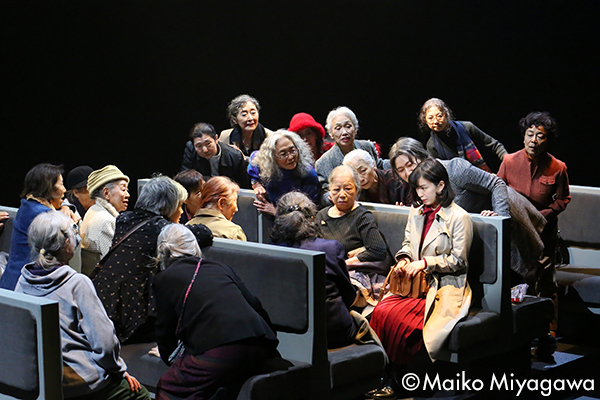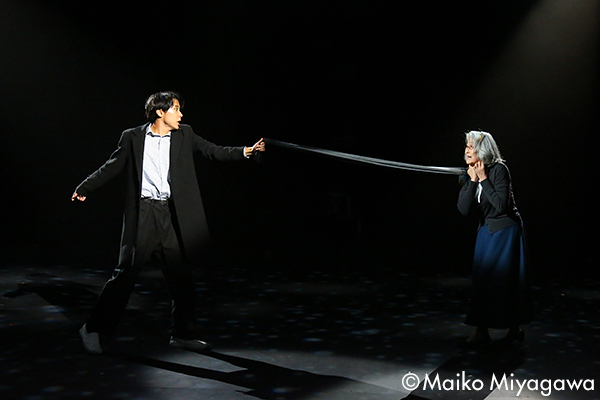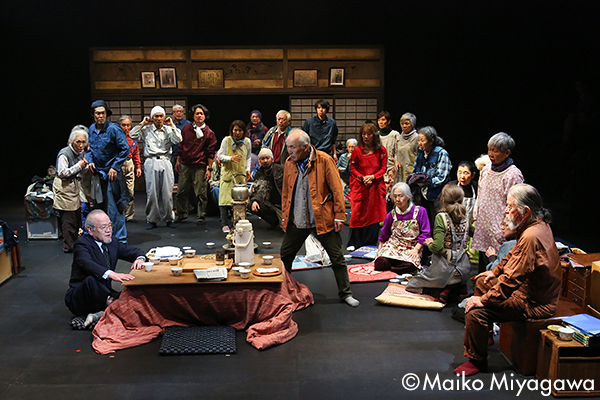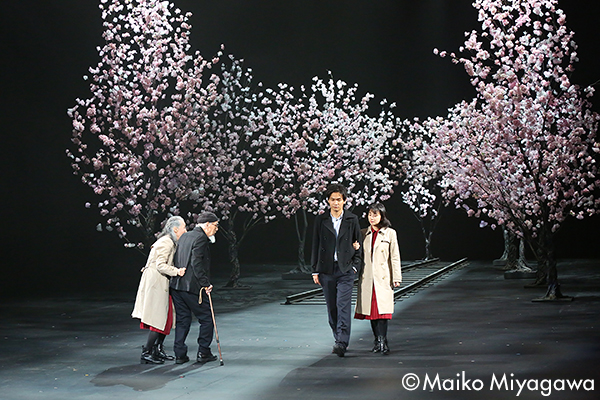



Saitama Gold Theater
Usui Momoiro no Katamari
(Sep. 21 – Oct.1.2017 at Saitama Arts Theater – Inside Theatre) Photo: Maiko Miyagawa
Data
:
Premiere: 2017
Usui Momoiro no Katamari

Born in Nagasaki Prefecture, Iwamatsu dropped out of college while majoring in Russian at the Foreign Language Department of the Tokyo University of Foreign Studies. He became active as a playwright, director and actor building on careers at the Jiyu Gekijo (Théâtre Libre) and Tokyo Kandenchi theater companies. Iwamatsu has written screenplays for and directed numerous TV dramas and movies. His representative plays include Futon and Daruma (1989, winner of the 33rd Kishida Drama Award), Hato wo Kau Shimai and Kowareyuku Otoko (1993, 28th Kinokuniya Drama Awards Individual Award), TV Days (1998, 49th Yomiuri Literature Drama Awards, Scenario Award), Usui Momoiro no Katamari (2017, 21st Tsuruya Nanboku Drama Award) and others. President of the Hyogo Prefectural Piccolo Theater Company since 2009.




Saitama Gold Theater
Usui Momoiro no Katamari
(Sep. 21 – Oct.1.2017 at Saitama Arts Theater – Inside Theatre) Photo: Maiko Miyagawa
Data
:
Premiere: 2017
The setting and time of this play is an area that the citizens were ordered to evacuate nuclear power plant accident related to the great earthquake and tsunami, and now that a few years have passed the evacuation order has finally been lifted. The Soeda family are among those who wanted to return and had taken advantage of temporary return leaves to work on their house to make it fit to live in again, but each time wild boars had returned to reek havoc on the home again, so almost no progress had been made. Manabu, the bread-winner of the Soeda family, was attacked by a wild boar, but he was saved from serious injury by a man named Hatayama who is an employee of the Tokyo headquarters of a company doing construction work related to the area’s recovery.
A scene opens at the Soeda home where a group of family and friends who frequent the home are grouped around Manabu’s rescuer Hatayama. Mr. Soeda (Manabu’s father) wants Hatayama to stay and have a meal of his wife Masako’s famed paella, but he leaves, saying he is busy and has to return to work.
“He left because you weren’t quick enough,” says Soeda, scolding Masako, but the others calm him, saying it wasn’t her fault. This group is working to repair the damage to their local coastal railway line so they can get it running again as a symbol of the area’s recovery, but the local government has proposed a new rail route farther inland, which has caused a conflict of opinions.
A “young man” stands atop a hill overlooking the railway line, where he has been waiting for the day when his girlfriend is supposed to return on it.
Midori is on a train from Tokyo, come to look for her boyfriend. She is talking with other women who happen to be in the same train car, telling them her romantic story of how she hasn’t seen her boyfriend in the six years since the earthquake and how they had made a pact not tell each other their real names until they had graduated and gotten jobs, calling each other Guy and Genie instead. The women are returning from a trip to meet with government officials to try to convince them to re-open the coastal train line.
Masako enters and finds Midori standing on the site of the former station where she had met with her boyfriend. There is a reddish purple bruise on Masako’s neck.
Hatayama enters to find the residents who have been working on local recovery projects are taking a break. He tells them the disappointing news that the company headquarters in Tokyo is putting pressure on their employees working to rebuild the train line and that at the headquarters they are saying that getting rid of the wild boars is a more urgent matter than rebuilding the train line.
In the rain, the “young man” is looking for an umbrella shop, but the people with umbrellas shout at him, “You deserve to be rained on, because it was you people who made this rain contaminated.” When the people with umbrellas leave, Masako is standing there alone. Both Masako and the young man are no longer able to see colors (since the nuclear plant accident). Lightning strikes and the two cling to each other. On Masako’s neck is the bruise ….
At the Soeda home. Hatayama tells Manabu Soeda that he is returning to his company’s Tokyo headquarters. Now recovered from his injuries inflicted by the boar, Manabu tells Hatayama that his mother lost her sense of color, and he asks Hatayama if he hasn’t lost his color sense too, but he gets no answer.
Receiving no answer to their petitions, and angry about the slow progress of the recovery work, the local residents are at a loss as to what to do. They don’t know where Hatayama has disappeared to either.
The young man arrives to find a wild boar and Hatayama faced off against each other atop a pile of rubble and tells him, “I am you.” Hatayama tells the young man—who is his other self—that he intended to tell his girlfriend that he had gotten a job when he met her again, and that he had promised himself that he would forget about his girlfriend until that person’s (Masako’s) color blindness was cured.
Midori continues to search for her former boyfriend. Going to a rest facility for women working on the local recovery projects, Midori asks if she can work with them. There she learns that Masako had died by hanging herself in the storage shed of the Soeda home.
Midori comes to the shed lit only by the light of the moon. Sensing someone’s presence, she hides in the shadows. She overhears a conversation between the young man, whose voice is strangely familiar, like that of her former boyfriend, and Masako. The young man turns into Hatayama and Masako into the corpse of the hanged woman. Hatayama is in fact the boyfriend “Guy” that Midori has been looking for, they are reunited and lie down together to sleep.
When Hatayama and Midori awake in the shed, they have grown old. The restored railway can now be seen, and alongside the train tracks are a row of cherry trees in full bloom. Crowds walk under the cherry blossoms and among them are the young Hatayama and Midori. The two couples, old and young, pass each other and exchange glances as the curtain falls to end the play.
Related Tags